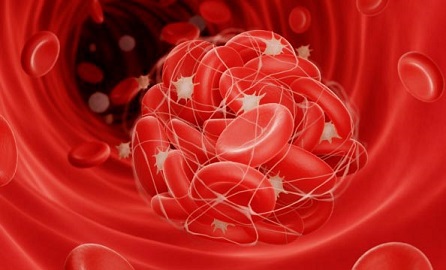Nikhil Prasad Fact checked by:Thailand Medical News Team Aug 25, 2024 7 months, 2 weeks, 5 days, 7 hours, 24 minutes ago
Medical News: Understanding COVID-19 Thrombosis: Insights from Recent Research
Researchers from the University of Cincinnati College of Medicine and the Sinai Center for Thrombosis Research and Drug Development in the United States have been delving deep into the distinct characteristics of thrombosis associated with COVID-19. This
Medical News report sheds light on their findings, focusing on the pathological features, mechanisms, and management of COVID-19-induced thrombus. This article aims to provide a comprehensive overview that is easy to understand for readers without a medical background. Readers should understand that thrombosis induced by the SARS-CoV-2 virus is different from that induced by other factors or medical conditions and that is why certain common drugs, blood-thinners and anticoagulants to prevent or threat thrombosis might not be effective in the COVID-19 context.
 Unveiling the uniqueness of COVID-19 induced thrombosis
The Rising Concern of Thrombosis in COVID-19
Unveiling the uniqueness of COVID-19 induced thrombosis
The Rising Concern of Thrombosis in COVID-19
Thrombosis, or the formation of blood clots, has been recognized as a significant complication in COVID-19 patients. The virus, primarily known for its respiratory implications, has been found to cause blood clots in both large and small blood vessels, affecting various organs. This discovery has raised concerns about the long-term effects of COVID-19, even after recovery. The study highlights the unique features of these clots, known as COVID-19 thrombi.
Key Findings: Pathological Features of COVID-19 Thrombi
The researchers identified that COVID-19 thrombi are characterized by a highly inflammatory signature. This inflammation is rooted in the endothelial cells, which line the blood vessels, and is often accompanied by the formation of neutrophil extracellular traps (NETs). NETs are web-like structures formed by neutrophils (a type of white blood cell) that trap and kill pathogens but can also contribute to clot formation. In COVID-19, the spike protein of the virus plays a crucial role in triggering this inflammatory response, leading to the formation of clots.
The study found that COVID-19 thrombi are not just limited to the early stages of the disease. Clots can form during the acute phase (2-4 weeks) and persist into the subacute (4-8 weeks) and even chronic phases (>12 weeks). This prolonged risk of thrombosis poses a challenge for patient management, as the risk does not disappear with the resolution of the initial infection.
Mechanisms Behind COVID-19 Thrombosis
One of the most intriguing aspects of the study is the exploration of the mechanisms driving COVID-19 thrombosis. The researchers applied Virchow's triad, a model traditionally used to understand clot formation, to COVID-19. This triad includes vascular injury, changes in blood flow, and a hypercoagulable state (increased tendency for blood to clot
It was found that in COVID-19, the virus directly injures blood vessels by binding to the ACE2 receptors on endothelial cells, causing inflammation and setting the stage for clot formation.
&am
p;nbsp;
Moreover, the study suggests that COVID-19 can trigger an autoimmune response, where the body's immune system mistakenly attacks its cells, further exacerbating clot formation. This autoimmune response can lead to long-term complications, including an increased risk of cardiovascular events like heart attacks and strokes.
The Impact on Different Phases of COVID-19
The findings underscore that thrombosis in COVID-19 is not limited to severely ill patients. Even those with asymptomatic, mild to moderate illness are at risk, particularly in the later stages of the disease. The research identifies different phases of COVID-19 - hyperacute, acute, subacute, convalescent, and chronic - each associated with varying risks of clot formation.
In the hyperacute phase (first 1-2 weeks), the risk is highest, particularly for venous and arterial clots. As the disease progresses into the acute (2-4 weeks) and subacute phases (4-8 weeks), the risk persists, albeit at a slightly lower level. However, the chronic phase (beyond 12 weeks) is particularly concerning as patients who appear to have recovered may still face an elevated risk of thrombosis, highlighting the need for ongoing vigilance and possibly extended anticoagulant therapy.
Management and Prevention Strategies
Given the complex nature of COVID-19 thrombosis, managing this condition requires a multifaceted approach. The study suggests that traditional anticoagulant therapies may not always be sufficient, particularly in the hyperacute phase. Therefore, there is a need for tailored strategies that consider the unique aspects of COVID-19 thrombi, such as their resistance to fibrinolysis (the body's natural process of breaking down clots).
The researchers propose a model for patient management that includes regular screening for thrombotic events, particularly in the later stages of COVID-19. This proactive approach could help in identifying patients at risk and initiating preventive measures early. Additionally, the study emphasizes the importance of continued research into the long-term effects of COVID-19 on the vascular system, particularly the potential for long-COVID or post-COVID conditions to contribute to ongoing clotting risks.
Conclusion: The Need for Ongoing Vigilance
The study's findings highlight the importance of recognizing COVID-19 as more than just a respiratory illness. The virus's ability to cause widespread inflammation and clot formation across different phases of the disease underscores the need for a comprehensive approach to patient care. For healthcare providers, this means not only treating the acute symptoms of COVID-19 but also monitoring patients for long-term complications, particularly those related to thrombosis.
As the global medical community continues to grapple with the long-term effects of COVID-19, studies like this one are crucial for informing treatment protocols and improving patient outcomes. The unique and persistent nature of COVID-19-related thrombosis calls for ongoing vigilance, research, and adaptation of management strategies to ensure that all patients receive the care they need.
The study findings were published in the peer-reviewed: Journal of Thrombosis and Thrombolysis.
https://link.springer.com/article/10.1007/s11239-024-03028-4
For the latest
COVID-19 News, keep on logging to Thailand
Medical News.
Read Also:
https://www.thailandmedical.news/news/new-study-uncovers-key-antibodies-linked-to-severe-covid-19-and-blood-clots
https://www.thailandmedical.news/news/extracellular-histones-and-procoagulant-extracellular-vesicles-drive-the-prothrombotic-state-in-covid-19
